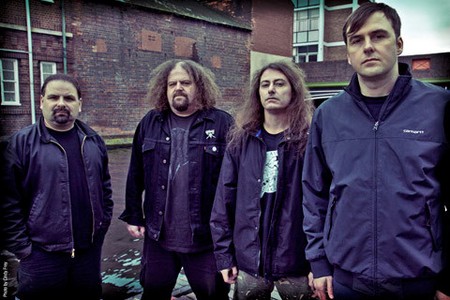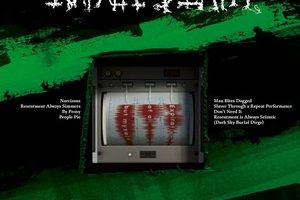Napalm Death – Apex Grindcore
Sunday, 11th January 2015
An institution of grindcore, and arguably its founders, Napalm Death have not lost much stream over the years. Still intent on delivering an experience that punishes the listener while simultaneously opening their eyes to some of the concerns of the modern world, these tactics have served the band well for over thirty years at this point. While other bands have come and gone, Napalm Death is standing strong, which brings us to their upcoming album, Apex Predator – Easy Meat.
Napalm Death’s 15th studio album, Apex Predator – Easy Meat is just as devastating as any other of their releases. With inspiration from the Rana Plaza building collapse from 2013, it works as a platform for the veteran band to blast and grind through another visceral metal journey. This writer leapt at the opportunity to chat with frontman Barney Greenway, even if it was for an all too short 15 minutes. While the conversation seemed to run more along socio-economic lines than musical, it seemed crazy not to discuss these concepts with someone who is very clearly passionate about what he sings (screams) about.
Dead Rhetoric: You mentioned the Rana Plaza in Bangladesh was an inspiration for the new album. Would you say it is a concept album or something that you just weigh in on throughout?
Barney Greenway: I go into albums, speaking to Shane [Embury] and saying, “You know what, we’ve done some many concept albums, I want to make one that isn’t conceptual and really loose” but it always ends up being another conceptual album every time [laughs]. I guess it’s just the nature of the way I write and the depth that I like to drill down into things. It usually takes me some time to get an album title together, but once it [the Rana Plaza] happened I was actually thinking I have to write an expose on this. You know, the slave labor conditions and the travesty of the way supply chains work, so that’s what I did.
Dead Rhetoric: So who is the “apex predator;” the people that are in power for the most part?
Greenway: The apex predator in this context are the companies and the conglomerates/corporations that are involved in basically, if not setting, then tolerating the conditions in which their workers are put under in the supply chains. The “easy meat” is of course those who are subject to those conditions. So you have a very clear separation there. Apex predator is evolutionary language, which we like to use that stuff. We’ve used that kind of terminology on a few albums, what with a few of us being quite enthusiastic Darwinists. So that was the idea with this one, and it follows through to the album art as well.
Dead Rhetoric: As a science teacher, it’s nice to hear about the Darwinism; it seems like there are a lot of people here in the US that are almost going backwards at this point.
Greenway: Yeah, I know what you’re saying. You don’t even have to explain any more than that. You know what, people are entitled to their beliefs. I don’t have a problem with that. But it does make me laugh, when the evidence is so clear. I don’t want to go off track too much, as I’ve put the boot into religion, not religious people, so many times. But there’s so much evidence and more evidence is mounting all the time. I just fail to realize how people can think the world is less than 6,000 years old. What utter nonsense, you know?
Dead Rhetoric: Going back to the “easy meat” aspect, what do you think about the future of society if we keep buying into this trend of immediate gratification and fake fulfillment?
Greenway: I think society in itself has a lot to answer for. The general societal system places its whole mechanism based upon hierarchies. And hierarchies of such scale that it turns out that “those that have” are protected the most. “Those that aren’t” are really just fair game. We’ve seen this in Europe especially, in recent times, with the austerity measures. Certainly in England, where we have a conservative government. Those who get hit the hardest are those on the bottom of the ladder. The real irony is that those arguably at the top: those in high finance and hedge funds, those in the financial sector, those that really have access to power or capital, they are protected the most still. Even after everything that happened in 2008 [the global economic crisis]. It’s such a delicious irony, it would almost be funny if it wasn’t so ludicrous.
Dead Rhetoric: Do you think that the way we are force-fed all of this stuff, do you feel that gets in the way of people opening their eyes and saying, “Enough is enough?”
Greenway: It’s always happening. The focus was on the Occupy movement a couple of years ago, but of course it’s a lot more wide-spread than that. It just wasn’t as centralized, so yeah there are people willing to stand up. But there’s still the divide and rule thing going on. If there is starting to be a condensed tidal wave of people coming together they will just throw a little spatter in the works. Maybe it’s turning immigrants against the perceived lower working class people, then that’s the way to divide and rule, keep people fighting towards the bottom end; it’s a classic tactic.
The thing about the manufacturing stuff on the album is only one part of it. But it’s that inequality, it’s the lack of an equitable situation. Sort of referring to the supply chains I’ve been talking on the album. The way that people are treated in supply chains, in industry – the manufacture of clothes, technology, and food. If that was done in any other aspect of human life, at ground level, it just wouldn’t be allowed. If you were caught doing it, you’d be in prison. So how is it that these corporations or even small to medium companies, how is it that they are able to get away with that stuff. I just don’t understand it, I really don’t.
Dead Rhetoric: Napalm Death has always had a strong lyrical standpoint. How important is the message that coincides with the music that you are making?
Greenway: I don’t think one is any more important than the other. We are a band; we aren’t standing on soapboxes out in the central square of the town or whatever, so there is an entertainment factor there. That’s not to say that either lyrics or the music get diminished by one or another; they run in tandem. Both are extremely important. I guess with the lyrics, one thing that I’m loathed to do when I’m talking about it is talk about issues. Because issues makes it almost sound like a shopping list. “What can I come up with on my shopping list of issues to talk about today?” That kind of downplays it. But these, I believe, are genuine human concerns. They are human concerns that are not only hazardous to those who are subject to certain conditions, but by just dehumanizing people further. There are already many dehumanizers; religion, which we’ve already talked about. Politics is another great dehumanizer. I think that the way that some people are kept down, restricted to manufacture and disposal. I mean that sort of imbalance, it should be a problem for everybody.
Dead Rhetoric: You have mentioned that some people think that there’s only so much you can accomplish with grind. Why do you think that perception is out there?
Greenway: It’s always a million miles an hour and it always sounds like a barking sea lion on vocals, so that’s some people’s literal perception of it. I think that obviously it’s a bit more than that, or it’s wherever bands chose to take it. I think that the grindcore genre has much to contribute to music in general, and I think it’s underestimated sometimes. I mean don’t get me wrong, I like white noise as much as the next person. I like music that annoys the fuck out of people, and as much as it also entertains people, so I definitely got that kick. You know, I get a real perverse love out of it really. But it has a lot more to offer too.
The thing with Napalm is, a lot of people often ask me, “What do you think about the genre; where do you think the genre should go?” My response is always, it’s not really my business. We are a part of it; perhaps people would argue quite a significant part of it. But we aren’t there to pull other people by the hand, other bands will take the genre where it needs to go and more power to them for doing that.
Dead Rhetoric: You have the 70,000 Tons of Metal cruise coming up, as well as the tour with Voivod. Is it safe to assume that you will be pretty well booked for 2015?
Greenway: It’s looking that way. There’s quite a lot for us to do. There’s a lot of stuff still being formulated, so it’s a ‘watch this space’ kind of thing. The response to the album so far it seems the people who’ve heard it really love it already, so it’s a good thing. I think that there should be a lot of stuff to do next year.
With all the lyrical stuff we’ve been talking about, I don’t want to beat people over the head with a stick, but I want to put the stuff on the table. Have people step back and have a look at it and see what they think. Maybe have a look about what happened at Rana Plaza and kind of understand a little bit more. All these companies are telling you, “Look we can make you goods, it’s really cheap, but they still look, taste, or play really good.” Step back and consider that there’s always a cost somewhere along the line and if you don’t pay, somebody else does it for you.



























